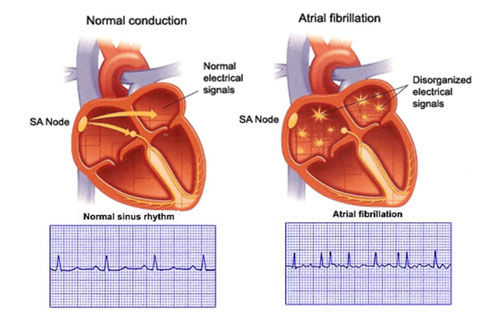“What About Atrial Fibrillation & Aortic Valve Disease?” asks Robert
By Adam Pick on October 21, 2014
As we learned in our recent post, Atrial Fibrillation: 5 Facts Valve Patients Should Know, it is very important for patients with valvular disorders to learn why and how atrial fibrillation (AFib) can impact the functioning of their heart and their surgical treatment. Shortly after posting, I received an excellent follow-up question from Robert about the potential connection between AFib and, specifically, the aortic valve. In Robert’s comment, he writes, “Adam, Was there any discussion of relationships between AFib and aortic valves, valve regurgitation, etc.?”

To provide Robert an expert opinion, I contacted Dr. Niv Ad, a leading cardiac surgeon at White Oak Medical Center in Maryland. As you might know, Dr. Ad is an AFib specialist who has published many research papers on this subject. In addition, Dr. Ad is an incredible patient advocate who hosts an annual AFib Patient Reunion which I’ve been fortunate to attend in the past.

1. Is there any connection between AFib and aortic valve disease? Does aortic valve disease cause AFib? Or, does AFib cause aortic valve disease?
I don’t think that there is a definite answer whether there is a connection between aortic valve disease and AFib. In some cases the hemodynamic changes secondary to the valve disease result in pressure and volume load in the atrial chambers that may be associated with atrial fibrillation. As for the second part of the inquiry, it would be very unlikely that AFib causes aortic valve disease, but I am not familiar with any research specifically looking into this question.
2. Is AFib and aortic valve disease treated the same way that AFib and mitral valve disease is treated?
This is a very interesting question and one of the areas I invested most of my research in recent years. If we look at the data from North America as summarized in a paper published by a group led by me (Journal Thoracic and Cardiovascular Surgery 2012;144:1051-60), only 30% of the patients presented to aortic valve surgery with a significant history of AFib had any type of surgical ablation, let alone a full Maze procedure that is probably most appropriate in the vast majority of these cases (unlike mitral valve with about 60% rate of intervention). The reasons for that are unclear to me, especially, when the experience was published and demonstrates that adding surgical ablation to an aortic valve replacement or an aortic valve replacement + coronary artery bypass graft (CABG) is not associated with an increased risk and probably improve long term survival. In this short answer, not everything known is included. But, I would like to stress two important points that patients should be aware of when discussing their surgery:
- Especially in patients with severe aortic stenosis and thick left ventricular muscle (diastolic dysfunction), the restoration of sinus rhythm is going to lead to an immediate improvement.
- Long term, the restoration of sinus rhythm is going to reduce the risk associated with life long anticoagulation treatment (blood thinners) and embolic events.
Patients that read this short answer should be aware of the data and consult their own surgeons for the appropriate treatment and approach in their case. In our practice, the likelihood of not addressing atrial fibrillation at the time of aortic valve surgery even when a patient requires aortic root work is very low.
I don’t know about you… But, that definitely helped me learn about atrial fibrillation and aortic valve disorders. Many thanks to Robert for his question and a special thanks to Dr. Niv Ad for sharing his extensive research and clinical expertise with our community.
Keep on tickin!
Adam
|
Bob Hardenburg says on October 22nd, 2014 at 7:16 am |
|
Adam thanks for the response. |
 |
|
Adam says on October 22nd, 2014 at 8:42 am |
|
No problem Bob! Great question! |
 |











